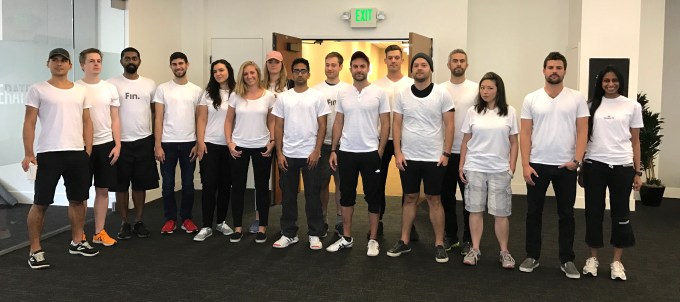“I have FOMO for the future”, says Sam Lessin. That’s why his startup, Fin, is working backwards from a far-off tech utopia. One day, computers with some human help will answer our every beck and call. Today, Lessin is teaming them up. Every day, Fin gets smarter.
For $1 a minute, 24/7, Fin gets your digital chores done. Message, email or speak a request and a real person will snap into action, augmented by a machine intelligence toolkit built from all the tasks Fin’s tackled to date. Sure, it handles research, scheduling, commerce and customer support calls. But it also learns your habits, negotiates for you, and conquers complex jobs like creating a website.
Now after two years and funding from top investors, including Kleiner Perkins, Fin is opening up to more customers and press. “We’ve really intentionally talked to no one,” says Lessin, a former Facebook VP who sold it his file sharing startup Drop.io.
That’s a vastly different approach than most boisterous AI startups have taken. “There’s been this crazy hype cycle,” Lessin tells me. “‘Everything’s a bot. Bots are awesome. Everything’s an assistant.’ All these things fucking suck.”
Converting money into time
Fin was determined not to suck, even if that meant staying quiet. Lessin and co-founder Andrew Kortina have tinkered and tested Fin since mid-2015. “I had done Venmo,” Kortina says, downplaying his co-founder role and its sale to PayPal, “and was then doing nothing. I heard Sam was also doing nothing and that piqued my interest, as he’s an old friend.”
Brainstorming led them to the thesis that “the internet is broken as an information machine,” Kortina tells me. They saw a greater destiny than entertainment, distraction and big enterprise. So in Fin’s first incarnation, the duo swapped neglected memos and to-do lists, and tried to find what they could get done for each other. Plenty had been falling through the cracks.

“I’m okay about doing menial things for colleagues but I’ll just let all that stuff in my own life slip,” Kortina admits. “I wouldn’t go to the dentist for years. I didn’t have health insurance after college for 10 years. My credit score was terrible because I had some bill I wouldn’t figure out how to pay.”
Most people have similarly boring tasks they loathe spending time dealing with. You could call the cable company to fight a price hike or research restaurants and hunt for a reservation. So could Fin. And thanks to Uber we’ve grown accustomed to being able to trade money for that time back, sidestepping slow public transportation or looking for parking when we’re in a rush.

Fin co-founders Sam Lessin (left) and Andrew Kortina (right) in front of the flag of Finland
While it’s easy to imagine Fin as merely a first-world luxury for the lazy, and it’s great at that, it’s also a productivity tool that can let people achieve more of what only they can do. Kortina talks about Fin as a way to “instantly offload” chores.
Even if you could power through a task faster than Fin could second-hand and keep the dollars, “It’s not just the cost of doing that thing yourself. It’s the context switching,” Kortina explains. “It’s so hard for me to get into a really good state of concentration and flow and creativity, and when I get into that state I don’t want to be interrupted.”
Reverse-engineering science fiction
Fin’s far from the only personal assistant startup trying to save you time, but many of the others fail due to hubris, relying too heavily on their own code as the answer to every question. “The mistake is looking at machine learning and thinking we’re so close to this general intelligence,” Lessin insists. Replacing humans outright isn’t the answer. “The future is people helping people.”
Competitors that can go AI-only are restricted to narrow sets of tasks, like x.ai for meeting scheduling. Traditional and virtual assistant services can be inefficient. Facebook’s M assistant also uses a combo of humans and AI but is free and hasn’t been opened up to the public.
One service similar to Fin called GoButler was forced to pivot to solely automated assistance, and eventually sold as scrap to Amazon. Fin’s most remaining direct competitor is Magic. It’s cheaper at $0.59 per minute but only takes requests via text message. Lessin moonlights as a partner for Slow Ventures, which participated in Magic’s $12 million 2015 Series A, which raises some concerns about conflicts of interest he wouldn’t comment on. [Update: More examples of competitors were added to this paragraph.]
But wait, isn’t AI supposed to take everyone’s jobs? Lessin envisions a new industrial revolution instead. He cites cobblers making a few shoes while waiting around the shop for customers, struggling to match fluctuating demand. But with steam and electricity “you had a new source of power. It’s not like power stopped work. You had humans doing what they were good at, tech doing what tech was good at, and you had way more shoes.”
With Fin, though, Lessin’s vision involves a team of round-the-clock operators equipped with AI and processes for similar tasks can snap into action even after-hours, rather than a full-time dedicated assistant being “paid for showing up being on YouTube” and then going off the job, Lessin says. Even if it’s expensive at $1 per effective minute of work, Fin is exceedingly convenient, and you don’t pay for down time.
To use Fin, you just pop open its minimalist black-and-white desktop site or iOS app, then type, speak or upload a photo of your request. If you’re unsure what you could ask for, there’s an anonymized feed of real examples from other users to spark your imagination.
“We can execute any task that doesn’t require hands in your city,” says Lessin, noting how hard it is for some startups to get local scale and capacity nailed down. “I have incredible respect for Instacart.” He also points out that “there are types of specialized knowledge we can’t currently do for you. Ask us some PhD physics problem and it will either take a long time or we won’t do it.”
Usually, though, you get messaged back almost immediately by a Fin human who collects any necessary details and gets started. I felt an instantaneous sense of relief upon outsourcing my responsibilities. Along the way, your task gets updated with progress and requests for secondary decisions. When possible, it just pulls things like addresses and airplane seat preferences from your onboarding survey, and payment information or online passwords from the app’s Vault. You get a detailed statement of exactly how Fin used your time and how much you owe.

“Our job is to mix the best tool or person for the job in a way to deliver an experience that’s better than you can get from working with a single isolated individual, or a piece of pure software,” Kortina declares.
That’s where the name “Fin” comes in. “Like ‘the end’ in French films,” Lessin reveals. “This is the interface and the ways things will work in 50 or 100 years.” While technology will get more and more adept at a wider range of tasks, he imagines that in the end, it will still be humans sending requests to computer-human teams.
The unevenly distributed future
The hardest part of using Fin is getting over the mental hurdle of relinquishing control while paying for what you could do yourself.
“I think that’s the real competitor,” says Lessin. Even factoring in what your time’s worth and the context switching overhead, Fin can produce some serious sticker shock. That’s accentuated by our idealized predictions that underestimate the time required to do things. “How long does it take to book movie tickets?” Lessin jokes. “30 seconds? No!”

Fin’s team
I was charged $80 to deal with having a mis-shipped iPhone X refunded and a new one bought and sent. While I was thankful not to have to deal with customer support, it was some pricey peace of mind. Getting a holiday restaurant reservation originally cost me $150, which is completely absurd even if it took several loops to find the right time and get me to sign a credit card payment form for the prix fixe dinner.
Luckily, I was refunded that $150 after submitting a complaint through the app, which is easy to do through Fin’s thumbs up/down buttons on each request. “Most really heavy users escalate / ask about something every month or two,” Lessin admits. Fin uses internal benchmarking tools to track if certain assistants take too long on a task or routinely do too much research in a category. Still, Fin sometimes goes overboard so users shouldn’t be shy about contesting any charges that seem ridiculous. You can sign-up through this link for TechCrunch readers to get a discount on your first tasks.
Fin initially launched in beta with a $120 per month subscription fee. But Kortina gripes that “all we were learning is how people could arbitrage Fin to do way more than $120 worth of service.” He seems to be having bad acid flashbacks to before Venmo started charging a 3 percent credit card fee in 2012, when people would just send money back and forth to hit minimum spending limit or earn points while Venmo ate the fees.
With the switch to per-minute pricing, “We’ve set ourselves up for the long haul by really focusing on unit economics,” says Lessin, in contrast to many on-demand startups. That surely delights Fin’s investors John Doerr at KPCB, Sameer Gandhi at Accel, and Saar Gur at CRV. While Lessin won’t reveal exactly how much Fin has raised, he calls them “good capital partners,” noting the startup has enough cash to “be able to do this for a long time.” Fin now has 20 employees on the technical side, while it’s climbing toward 100 when you include its full-time operators.
Not subsidizing the service is a healthy choice for Fin, but that means “Unfortunately it’s not at a price point that everyone on Earth can afford.” Whether through economies of scale, AI advancement, or human training, Fin may need to bring the price down if it wants widespread adoption. “The future is already here” sci-fi author William Gibson once said, “it’s just not very evenly distributed.”
The premium price tag begets premium service that makes Siri and her cohorts feel like mere calculators in comparison. “The message is you should demand a lot more out of assistant services than cooking timers and Google search lookups,” Lessin concludes. In an era when technology is designed to soak up the maximum amount of your time, Fin lets you buy it back. We’ll each have to decide how much it’s worth.
